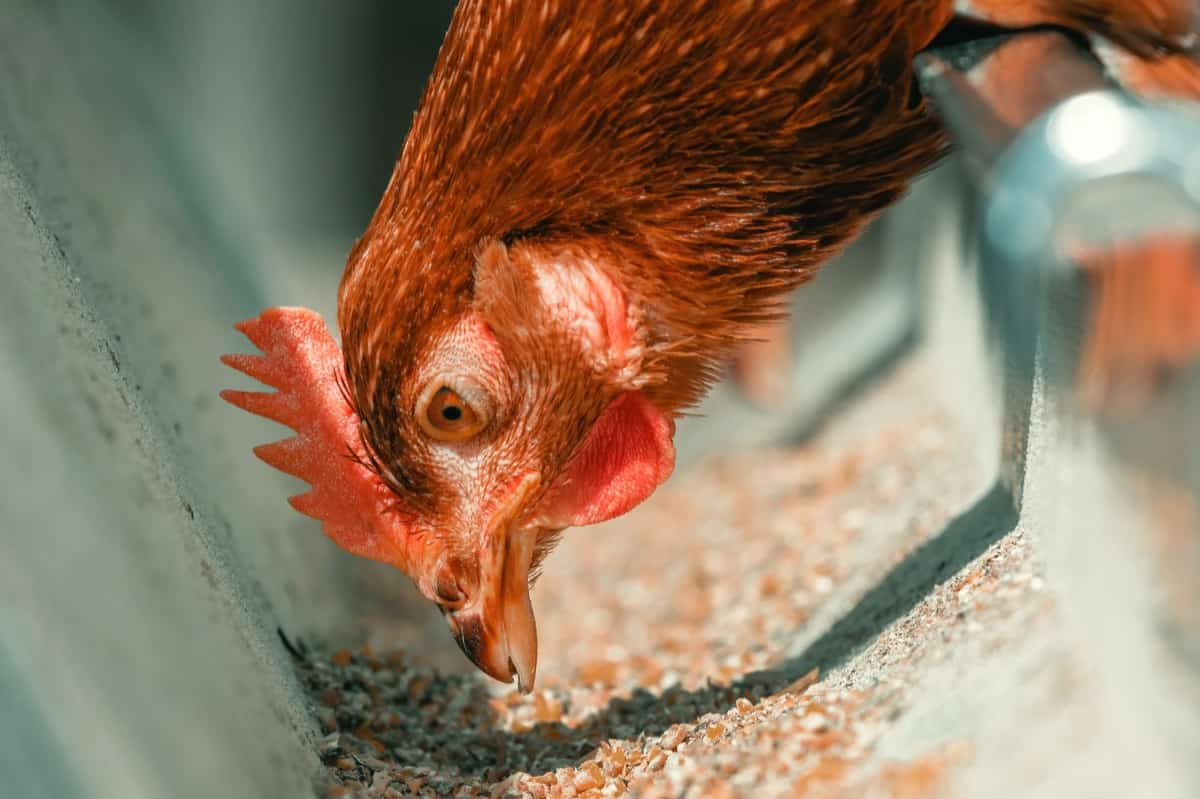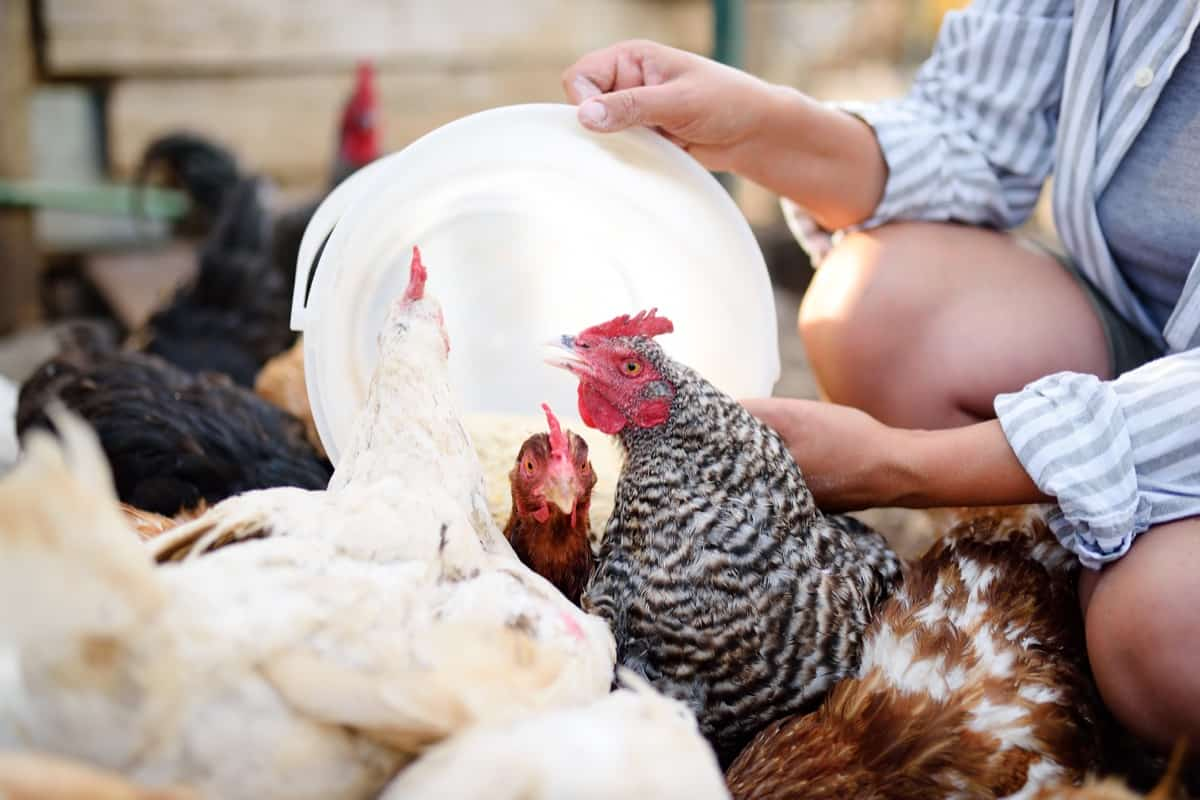Food provides chickens with the necessary nutrients they need to function properly. Chickens require protein for muscle development and maintenance, carbohydrates for energy, fats for insulation and proper organ function, and vitamins and minerals to support their immune system. Proper nutrition can improve the health and lifespan of your birds, as well as increase their egg production.

What and How to Feed Your Chickens
Best Chicken Feed for Egg Production
Layer feed is one of the best types of chicken feed for egg production. This type of feed contains higher levels of calcium and nutrients necessary for strong eggshells. Layer feeds also typically have added amino acids, which can boost the overall protein content in your chickens’ diet. Another option to consider is organic chicken feed. Organic feeds are made with non-GMO ingredients and do not contain pesticides or synthetic additives.
Organic options may be worth exploring if you want a more natural approach to feeding your chickens. Finding the best chicken feed for egg production will depend on your breed of chickens and their dietary needs. Consulting with an expert or researching different brands and formulations can help you decide what will work best for your flock.
Organic Chicken Feed for Healthy Birds
- Organic chicken feed contains ingredients free from synthetic pesticides, herbicides, and fertilizers. This means your chickens’ food won’t contain harmful chemicals or toxins.
- The main benefit of using organic chicken feed is that it can help promote healthier birds. Since the ingredients used in this feed are all-natural, they tend to be easier for chickens to digest. This can lead to improved overall bird health and well-being for your flock.
- The organic chicken feed may also help improve egg quality and production rates. Chickens who consume an organic diet tend to produce eggs with higher nutrient levels than those who don’t. Plus, since the ingredients are natural and free from artificial additives, you’ll know exactly what’s going into each egg your hens lay.
Feeding Baby Chickens: What Do They Need?
- Providing them with the proper nutrients for optimal growth and development is important. Starting from day one, baby chickens require a specialized feed that is high in protein and lower in calcium content compared to adult chicken feed.
- A good starter feed should contain around 18-20% protein and be specifically formulated for baby chickens. Choosing a reputable brand of baby chicken starter is crucial as some cheaper feeds may not have all the necessary vitamins and minerals for healthy baby chicken development.
- In addition to their main feed, it’s also important to ensure your baby chickens have access to clean water at all times. Adding apple cider vinegar or electrolytes into their drinking water is a great way to encourage hydration.
- As your baby chickens grow older, you can gradually introduce different types of food, such as fruits, vegetables, and even live insects like mealworms.
- Feeding baby chickens requires special attention and care, but they will develop into happy and healthy adults with the right nutrition plan.
How to Create a Balanced Diet for Backyard Chickens?
- A balanced diet for your backyard chickens is essential in maintaining their overall health and productivity. It promotes proper growth, helps produce high-quality eggs, and keeps your flock happy.
- Start by providing them with high-quality commercial feed specifically formulated for chickens. This ensures they receive the right nutrients, such as protein, vitamins, and minerals necessary for their well-being.
- Scratch grains can be an enjoyable treat for your birds in moderation. However, ensure that this makeup no more than 10% of their daily intake to maintain a nutrient-rich diet.
- Provide constant access to clean water to keep them hydrated throughout the day. Chickens require ample water not only for drinking but also for digestion purposes.
What Can I Feed My Chickens Besides Commercial Feed?
- You can incorporate kitchen scraps into their diet. Vegetables like lettuce and carrots or fruits like apples and berries make great treats for your feathered friends. Remember that these should only make up a small portion of their diet.
- Chickens love mealworms, crickets, and grasshoppers. This will give them an extra source of protein and simulate their natural behavior in the wild.
- If you can access pasture or garden space, allowing your chickens to free-range can give them various nutrients from grazing on fresh grasses and plants.
- Make your homemade chicken feed using grains like oats or barley and supplements such as calcium powder or dried kelp.
In case you missed it: Sapphire Gem Chicken: Breed Origin, Temperament, Facts, Raising, and Care

How Often to Feed Your Chickens?
- Providing your birds with a balanced and nutritious diet is essential to maintaining their health and productivity.
- Generally, an average chicken requires 1/4 to 1/2 cups of daily feed. This amount may vary depending on your chickens’ breed and age.
- In addition to regular feed, you can supplement their diet with fruits and vegetables. These healthy snacks entertain your chickens as they peck around looking for treats.
- However, it’s important not to overdo it when feeding extra snacks, as they shouldn’t exceed 10% of their daily feed intake. Overfeeding treats may lead to obesity, which could cause health issues.
Feeding Chickens for Optimal Growth and Development
- One way to promote healthy growth in your chickens is by feeding them high-quality poultry feed formulated specifically for their nutritional needs. Make sure you choose a feed that contains all the necessary vitamins and minerals like calcium, phosphorus, and vitamins A, D3, and E.
- In addition to commercial feeds, supplementing their diet with treats like vegetables, fruits, or grains can promote optimal growth.
- It’s important not to overlook the importance of water in chicken nutrition. Always provide fresh water; dehydration can lead to various health problems, such as reduced egg production or death.
- As your birds grow older, adjust their feed accordingly based on their changing nutritional needs according to age groups recommended by veterinarians (starter/grower/layer). With proper nutrition management practices in place, including monitoring Feed Conversion Ratio (FCR), keeping records & regular veterinary checkups – you’ll have happy, healthy hens laying nutritious eggs.
How to Prevent Nutritional Deficiencies in Chickens?
Like other creatures, chickens require a balanced diet to maintain optimal health and prevent nutritional deficiencies. A deficiency in one or more essential nutrients can lead to poor egg production, weak bones, and even death. As a chicken owner, you ensure your birds receive the necessary nutrients through their feed. To avoid nutritional deficiencies in chickens, you must provide them with a complete and well-balanced feed containing all the required proteins, carbohydrates, fats, vitamins, and minerals.
Choosing high-quality feeds from reputable suppliers is important, as low-quality feeds can contain harmful toxins that could harm your birds. Forage feeding is another way of maintaining optimal nutrition levels in chickens by providing them with fresh pasture plants or growing microgreens indoors during winter when outdoor grazing isn’t possible.
Feeding Chickens During the Winter: Tips and Tricks
- One trick for feeding chickens in winter is providing them with warm water. Chickens don’t like drinking cold water, so make sure their water source doesn’t freeze by changing it frequently or providing a heated bowl.
- Another trick is to offer high-fat foods such as black oil sunflower seeds or suet cakes, which help keep the birds’ metabolism up and provides them with extra calories they need during cold temperatures. You could also consider adding cooked oatmeal and raw eggs to their diet for protein.
- It’s important not to overfeed your flock, as excess food will attract rodents and other pests looking for an easy meal. Investing in chicken heaters or heating lamps may be necessary if you’re raising chickens in areas where winters are harsher than usual.
In case you missed it: Can Chickens Eat Oranges, Tomatoes, Grapes, Garlic, Banana Peels, Pineapple, Strawberries, Celery, and Asparagus?

Conclusion
Providing high-quality feed for your chickens means you’ll get higher-quality eggs from healthier hens. Feeding your chickens properly is crucial for their overall health and well-being. A balanced diet ensures they receive the nutrients, vitamins, and minerals needed to grow strong bones and maintain a healthy immune system. Nutrition also plays an essential role in egg production.
- Feed Your Flock for Less: Top 10 Tips to Save on Chicken Feed
- Ultimate Guide to Ossabaw Island Hog: Breeding, Raising, Diet, and Care
- Hatching Answers: The Top 10 Reasons Your Chickens Aren’t Laying Eggs
- Eggs and Economics: Breaking Down the Cost of Raising Backyard Chickens
- Defend Your Greens: Proven Methods to Keep Iguanas Out of Your Garden
- Ultimate Guide to Cinnamon Queen Chicken: A Comprehensive Guide for Beginners
- Ultimate Guide to California Tan Chicken: Breeding, Raising, Diet, Egg-Production and Care
- Ultimate Guide to Marsh Daisy Chicken: Breeding, Raising, Diet, and Care
- 10 Types of Chicken Farming Businesses You Can Start for Profits